13 Best Herbal Tinctures For Ulcerative Colitis
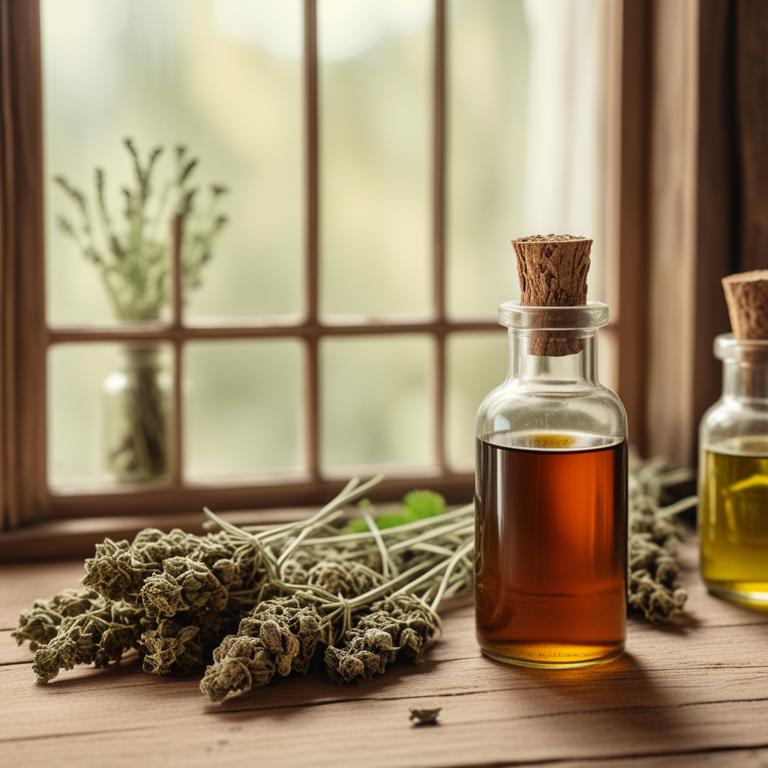
Herbal tinctures for Ulcerative Colitis are liquid extracts derived from plants that are used to treat the symptoms of this chronic inflammatory bowel disease.
These herbal remedies offer a natural alternative to conventional medications and have been shown to provide several benefits, including reduced inflammation, improved digestion, and enhanced overall well-being.
Some examples of herbal tinctures used to treat Ulcerative Colitis include Slippery Elm, which soothes the mucous membranes and protects the gut lining, Marshmallow Root, which has anti-inflammatory properties and helps to reduce inflammation, and Turmeric, which contains curcumin, a potent antioxidant that reduces inflammation and promotes healing.
Additionally, Ginger, Licorice Root, and Peppermint oil have also been found to be beneficial in managing Ulcerative Colitis symptoms, as they aid in digestion, reduce inflammation, and provide relief from abdominal pain and cramping.
According to the "Journal of clinical gastroenterology", tinctures for ulcerative colitis, specifically Tormentil extracts, were observed to have positive effects in individual patients with ulcerative colitis, with improved clinical activity index and C-reactive protein levels during therapy.
Below there's a list of the 13 best herbal tinctures for ulcerative colitis.
- 1. Curcuma longa tinctures
- 2. Zingiber officinale tinctures
- 3. Ulmus rubra tinctures
- 4. Glycyrrhiza glabra tinctures
- 5. Aloe vera tinctures
- 6. Althaea officinalis tinctures
- 7. Terminalia chebula tinctures
- 8. Glycyrrhiza uralensis tinctures
- 9. Taraxacum officinale tinctures
- 10. Trifolium pratense tinctures
Also you may be interested in...
TODAY'S FREE BOUNDLE
Herb Drying Checklist + Herbal Tea Shopping List + Medicinal Herbs Flashcards
Enter you best email address below to receive this bundle (3 product valued $19.95) for FREE + exclusive access to The Aphotecary Letter.
$19.95 -> $0.00
1. Curcuma longa tinctures

Curcuma longa tinctures, derived from the turmeric plant, have been found to be effective in treating ulcerative colitis due to their anti-inflammatory and antioxidant properties.
The bioactive constituents of Curcuma longa, including curcumin, demethoxycurcumin, and bisdemethoxycurcumin, exhibit potent anti-inflammatory and immunomodulatory effects, which help to reduce inflammation and modulate the immune response in the colon.
This herbal preparation helps to treat ulcerative colitis by inhibiting the production of pro-inflammatory cytokines and enzymes, reducing oxidative stress, and promoting the healing of the colonic mucosa.
The benefits of using Curcuma longa tinctures to treat ulcerative colitis include reduced symptoms, improved quality of life, and a potential reduction in the need for corticosteroids and other conventional treatments.
Related Study
According to "Medical principles and practice : international journal of the Kuwait University, Health Science Centre", Curcuma longa tinctures for ulcerative colitis show a clear benefit, as they were found to be beneficial in at least 2 studies.
2. Zingiber officinale tinctures

Zingiber officinale tinctures, derived from the rhizome of the ginger plant, have been traditionally used to treat ulcerative colitis, an inflammatory bowel disease characterized by chronic inflammation and ulcers in the colon.
The anti-inflammatory and antioxidant properties of Zingiber officinale tinctures help to reduce inflammation and oxidative stress in the colon, promoting healing and reducing symptoms of the disease.
The bioactive constituents of Zingiber officinale, including gingerols and shogaols, have been shown to inhibit the production of pro-inflammatory cytokines and enzymes, which contribute to the development of ulcerative colitis.
By reducing inflammation and promoting healing, Zingiber officinale tinctures can help to alleviate symptoms of ulcerative colitis, such as abdominal pain, diarrhea, and weight loss, and improve quality of life for individuals with this condition.
3. Ulmus rubra tinctures
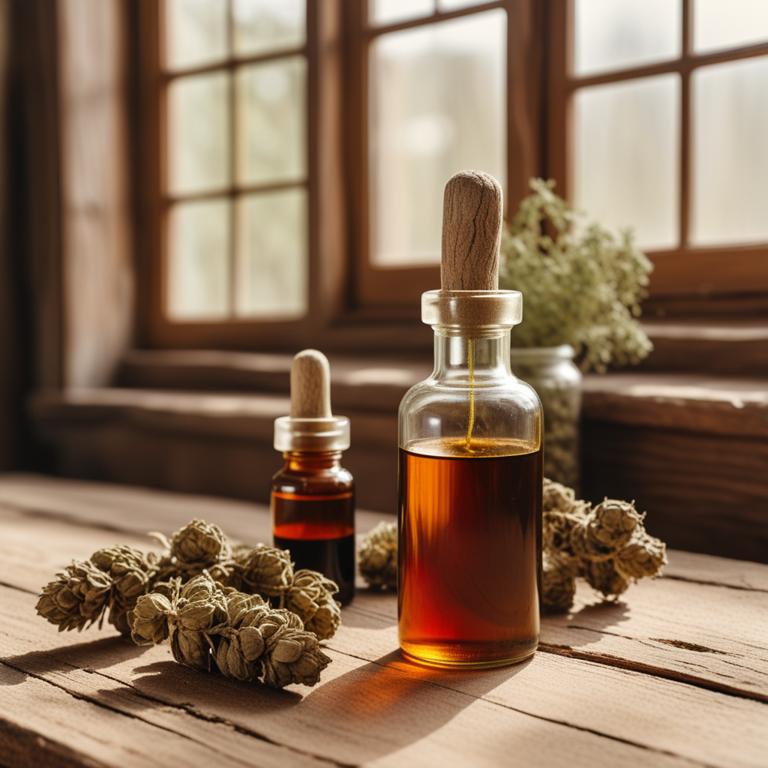
Ulmus rubra tinctures have been traditionally used to treat ulcerative colitis due to their anti-inflammatory and antioxidant properties.
The bioactive constituents of Ulmus rubra tinctures, such as flavonoids and phenolic acids, help to reduce inflammation and oxidative stress in the colon, thereby alleviating symptoms of ulcerative colitis.
The tinctures also possess antimicrobial properties that aid in the elimination of harmful bacteria in the gut, promoting a healthy gut microbiome and reducing inflammation.
Regular use of Ulmus rubra tinctures has been associated with reduced symptoms of ulcerative colitis, improved quality of life, and a decrease in the risk of complications associated with the condition.
4. Glycyrrhiza glabra tinctures

Glycyrrhiza glabra tinctures have been traditionally used to treat ulcerative colitis, an inflammatory bowel disease characterized by chronic inflammation and ulceration of the colon.
The anti-inflammatory and antioxidant properties of this herbal preparation help to reduce inflammation, alleviate symptoms, and promote healing in the colon.
Glycyrrhiza glabra tinctures contain bioactive constituents such as glycyrrhizin, flavonoids, and saponins, which have been shown to inhibit pro-inflammatory cytokines, reduce oxidative stress, and improve gut barrier function.
By using Glycyrrhiza glabra tinctures, individuals with ulcerative colitis may experience benefits such as reduced symptoms, improved quality of life, and a decrease in the need for conventional medications.
5. Aloe vera tinctures
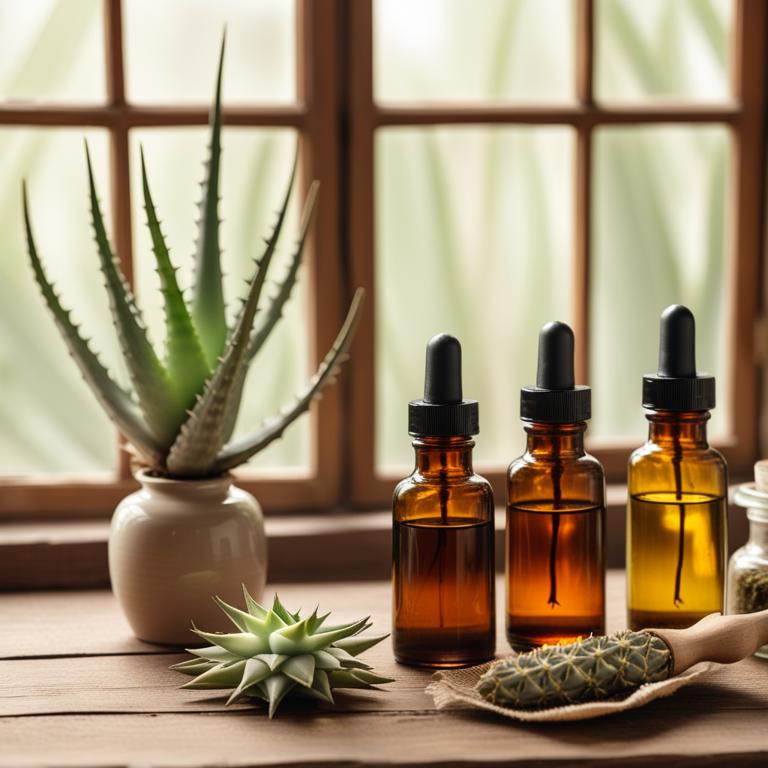
Aloe vera tinctures have been traditionally used to treat ulcerative colitis, an inflammatory bowel disease characterized by chronic inflammation and ulceration of the colon.
The anti-inflammatory and soothing properties of aloe vera tinctures help to reduce inflammation and promote healing in the gastrointestinal tract, thereby alleviating symptoms such as diarrhea, abdominal pain, and weight loss.
The bioactive constituents of aloe vera tinctures, including aloin, aloe-emodin, and acemannan, have been shown to exhibit anti-inflammatory, antioxidant, and immunomodulatory effects, which contribute to their therapeutic benefits.
By reducing inflammation and promoting healing, aloe vera tinctures can help to improve the quality of life for individuals suffering from ulcerative colitis, making them a valuable complementary therapy for this condition.
Related Study
According to "Current pharmaceutical biotechnology", Aloe vera tinctures for ulcerative colitis may be a potential treatment option due to their promising activity against inflammatory bowel disease, with further preclinical and clinical studies needed to confirm their safety and efficacy.
6. Althaea officinalis tinctures
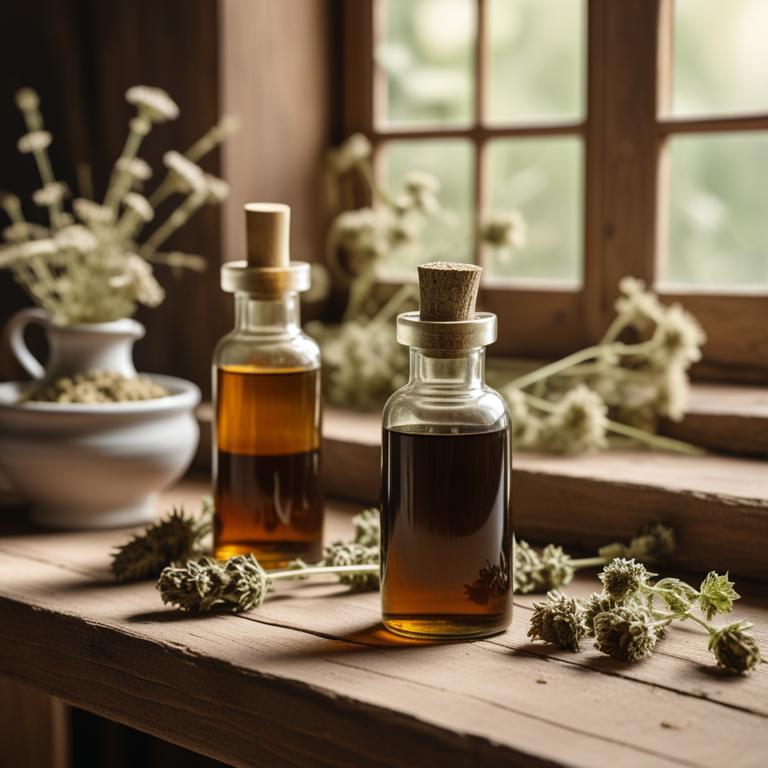
Althaea officinalis tinctures, derived from the marshmallow plant, have been traditionally used to treat various gastrointestinal issues, including ulcerative colitis.
The mucilaginous properties of this herbal preparation help to soothe and protect the mucous membranes in the colon, reducing inflammation and promoting healing.
The bioactive constituents, including mucilages, flavonoids, and phenolic acids, contribute to its anti-inflammatory and antioxidant effects, which aid in alleviating the symptoms of ulcerative colitis.
By reducing inflammation and promoting healing, Althaea officinalis tinctures offer a natural and potentially beneficial approach to managing ulcerative colitis, with benefits including reduced symptoms, improved quality of life, and a decrease in the reliance on conventional medications.
7. Terminalia chebula tinctures
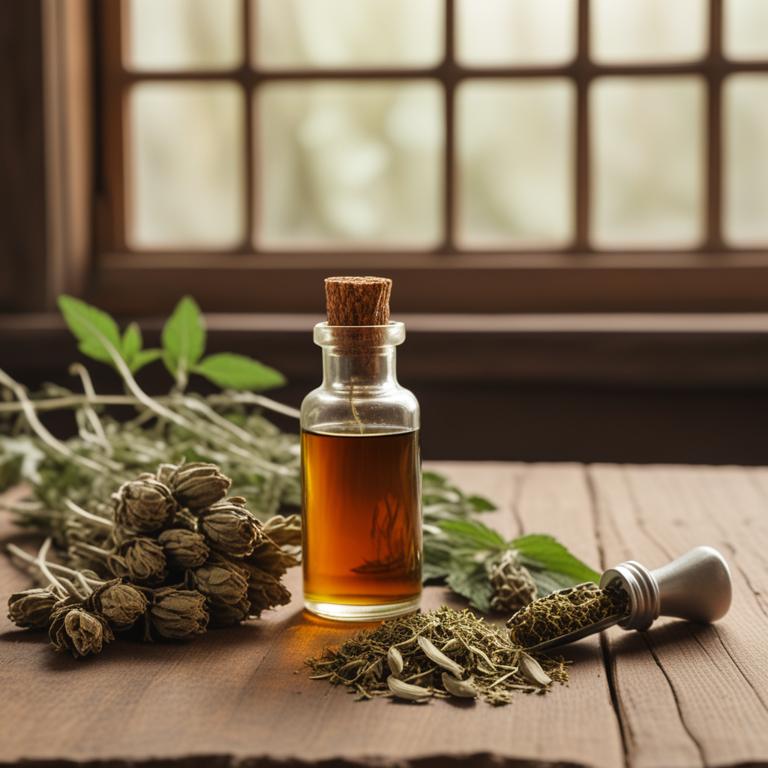
Terminalia chebula tinctures have been used traditionally to treat various gastrointestinal issues, including ulcerative colitis, due to their anti-inflammatory and antioxidant properties.
The tannins, flavonoids, and phenolic acids present in Terminalia chebula tinctures help to reduce inflammation and oxidative stress in the colon, thereby alleviating symptoms of ulcerative colitis.
By modulating the gut microbiota and inhibiting pro-inflammatory cytokines, Terminalia chebula tinctures promote healing and reduce the severity of ulcerative colitis.
The benefits of using Terminalia chebula tinctures to treat ulcerative colitis include reduced symptoms, improved quality of life, and a potential reduction in the reliance on conventional medications.
8. Glycyrrhiza uralensis tinctures
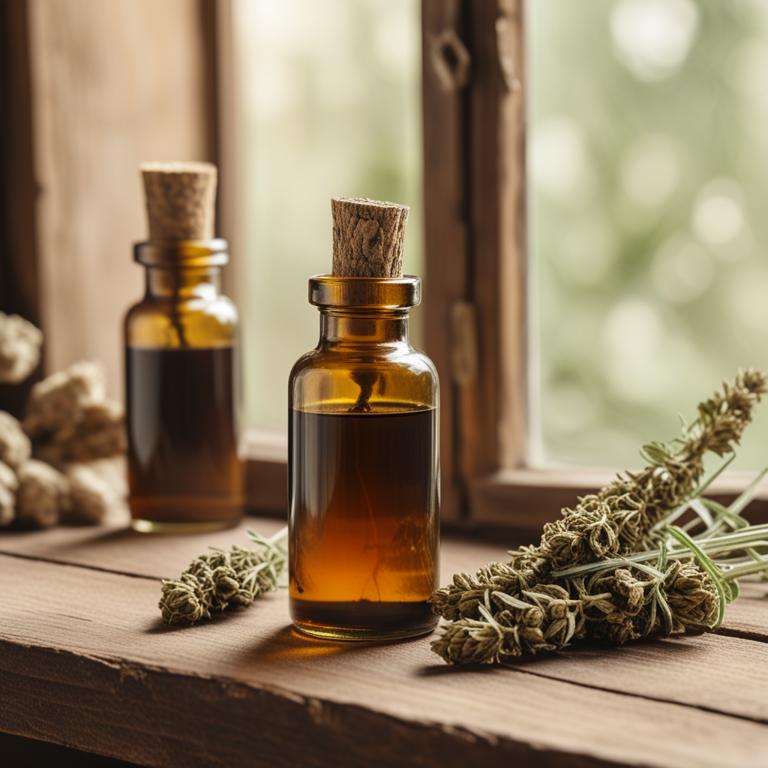
Glycyrrhiza uralensis tinctures have been traditionally used to treat ulcerative colitis due to their anti-inflammatory and antioxidant properties.
The bioactive constituents, including glycyrrhizin and flavonoids, help to reduce inflammation and modulate the immune response in the gut, thereby alleviating symptoms of ulcerative colitis.
By inhibiting the production of pro-inflammatory cytokines and promoting the production of anti-inflammatory cytokines, Glycyrrhiza uralensis tinctures can help to reduce inflammation and heal the lining of the colon.
The benefits of using Glycyrrhiza uralensis tinctures to treat ulcerative colitis include reduced symptoms, improved quality of life, and potentially reduced reliance on conventional medications.
9. Taraxacum officinale tinctures
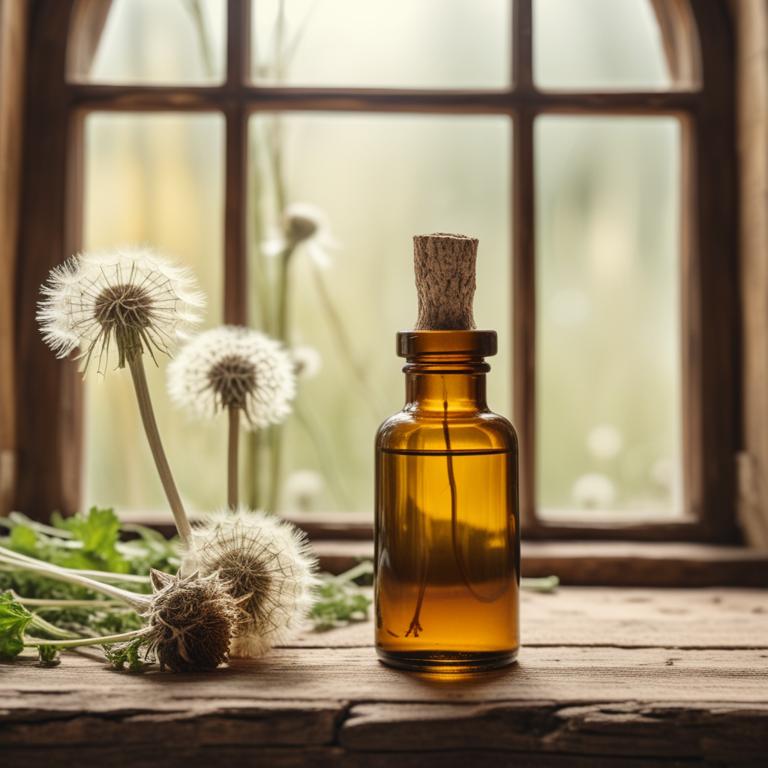
Taraxacum officinale tinctures have been studied for their potential in treating ulcerative colitis, a chronic inflammatory bowel disease.
The anti-inflammatory and immunomodulatory properties of these tinctures, which are rich in sesquiterpene lactones, such as taraxasterol and inulin, help to reduce inflammation and promote healing in the gut.
By modulating the immune system and reducing oxidative stress, Taraxacum officinale tinctures may help alleviate symptoms of ulcerative colitis, including abdominal pain, diarrhea, and rectal bleeding.
The benefits of using these tinctures to treat ulcerative colitis include reduced inflammation, improved gut health, and a decrease in the need for conventional medications.
10. Trifolium pratense tinctures
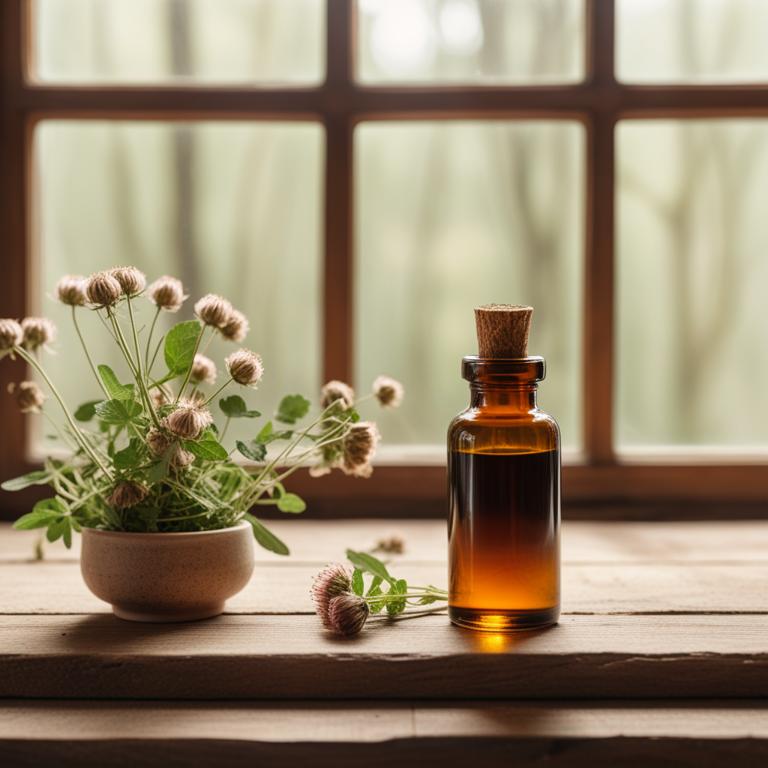
Trifolium pratense tinctures, derived from the red clover plant, have been used to treat ulcerative colitis due to their anti-inflammatory and antioxidant properties.
The isoflavones and polyphenols present in this herbal preparation help to reduce inflammation and oxidative stress in the colon, thereby alleviating symptoms of ulcerative colitis.
The bioactive constituents, including formononetin and biochanin A, have been shown to inhibit the production of pro-inflammatory cytokines and promote the healing of the gut lining, leading to improved symptoms and quality of life.
Regular use of Trifolium pratense tinctures may provide benefits in reducing the severity of ulcerative colitis and promoting overall gastrointestinal health.
Related Study
According to "Drug design, development and therapy", Trifolium pratense tinctures have been found to have natural anti-ulcer activity by protecting the mucosa, reducing ulcer effects, and inhibiting pro-inflammatory factors, which could potentially be beneficial for treating ulcerative colitis.